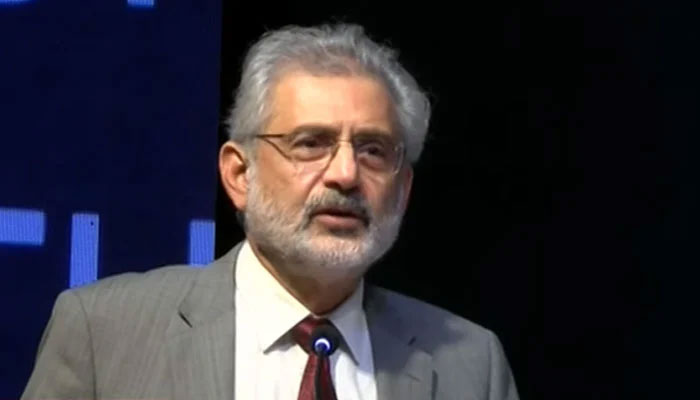Justice Isa-led commission to probe audio leaks
Government notification says the panel to also have BHC, IHC chief justices
ISLAMABAD: The federal government on Saturday constituted a Judicial Commission to probe the veracity of recent audio leaks and their impact on the independence of the judiciary.
According to a notification issued here, the government constituted a three-member Judicial Commission, headed by a senior judge of the Supreme Court Justice Qazi Faez Isa and comprising Islamabad High Court Chief Justice Aamer Farooq and Balochistan High Court Chief Justice Naeem Akhtar Afghan.
“In exercise of powers conferred under Section 3 of the Pakistan Commission of the Inquiry Act 2017, the federal government is pleased to constitute an inquiry commission to probe into the veracity of alleged audio leaks raising serious apprehensions about the independence of the judiciary in the public interest,” the notification said.
The Terms of Reference (ToR) of the commission would be to inquire into the veracity of audio leaks allegedly concerning, (a) call between Punjab ex-CM and an advocate regarding a sitting judge of the Supreme Court, (b) between Punjab ex-CM and an advocate regarding fixation of some cases before a particular bench of the Supreme Court, (c) between Punjab ex-CM and a sitting judge of the Supreme Court, (d) between a former chief justice of Pakistan and a senior lawyer, (e) between a lawyer and a journalist on the outcome of a case before a particular bench of the Supreme Court, (f) between former prime minister of Pakistan and his party colleague about their links in the Supreme Court and wife of a lawyer regarding cases in the Supreme Court and hoping for un-constitutional rule (h) between son of former CJP and his friend mentioning his father in a political role.
Similarly, the notification stated that the Judicial Commission would also inquire into the correctness of the allegations surfacing on print and electronic media and the social media allegedly regarding son-in-law of the Lahore High Court chief justice of influencing judicial proceedings before the high court.
Likewise, the commission would determine violation, if any, of integrity of the process of administration of justice, independence of judiciary, right to fair trial and equality of citizens.
Similarly, the commission had been tasked to recommend any necessary legal action by any agency, department or persons and if the stated audios were fake or fabricated, to inquire into and fix responsibility with regards, as to who was making the audios and recommend action to be taken.
According to the notification, the commission would have all the powers that were granted to it under the Act and including those mentioned in Section 10 of the Act.
“It shall be the duty of all the executive authorities in the Federation and provinces to act in aid of the commission in discharge of its functions and to comply with any of its decisions,” said the notification.
Furthermore, the commission would be entitled to establish a secretariat and appoint a secretary for the stated inquiry at the cost of the government while the attorney general would assist the commission and provide it with all documents and material that it required.
The commission would initiate the inquiry immediately after the notification of its constitution and would conclude the inquiry and submit its report to the government within 30 days.
“However, if the commission required further time, the government would grant it,” the notification read.
The government said the audio leaks raised serious apprehensions about the independence of the judiciary in the public interest; therefore, it has constituted the commission under Section 3 of the Pakistan Commissions of the Inquiry Act 2017.
It stated that such audio leaks had eroded public trust and serious concerns had been raised by the general public regarding the independence, impartiality and uprightness of the chief justice and judges of the superior courts. The notification mentioned that the judiciary is one of the main pillars of the Constitution and the society’s confidence gets shattered when the independence of the judiciary is tarnished.
“It is imperative to inquire into the authenticity, correctness and veracity of these audio leaks in order to restore not just the credibility of the judiciary but also the public trust and confidence in the Judiciary in the larger public interest, as a matter of definite public importance,” it added.
Meanwhile, Federal Minister for Law Azam Nazeer Tarar said that Chief Justice Umar Ata Bandial was not consulted before the formation of the probe panel.
The minister further said that the LHC Chief Justice Muhammad Ameer Bhatti had also not been included in the commission. When asked to comment on the need for a probe into the matter, Tarar said: “The reputation of the institutions was affected by the audio leaks.” He said that one of the senior-most judges of the Supreme Court had been made the commission’s chief.
Pakistan Tehreek-e-Insaf (PTI) Chairman Imran Khan, meanwhile, demanded that the high-powered judicial commission — headed by Justice Qazi Faez Isa — on audio leaks “should be empowered to investigate powerful and unknown elements” behind the phone tapping.
In a detailed statement on his Twitter handle, the former prime minister said the federal government has formed an inquiry commission under “Section 3 of the Commissions of Inquiry Act 2017” to investigate into the issue of audio leaks.
However, the TORs set by the government suffered from a deliberate omission, he said.
“They fail to take into account the issue that who is behind unlawful and unconstitutional surveillance of PM office and sitting judges of the Supreme Court.”
He demanded that the commission should be empowered to investigate who are these powerful and unknown elements who tap and record telephone conversations of citizens, including high public functionaries. Imran, who was ousted from power in April last year, said the wiretapping was a serious breach of privacy guaranteed under Article 14 of the Constitution.
“Not only those who illegally retrieve data through unlawful phone tapping and surveillance should be held accountable but those who through fabrication and tampering of different phone calls leak them on social media also need to be held accountable.”
“Democracies governed by the rule of law propose that the state should not arbitrarily intrude into certain aspects of life. Right to privacy and dignity guaranteed under Article 14 are patently infringed whenever the state unlawfully surveils an individual,” he added.
Imran said some of the recent leaked calls were made over what was supposed to be a secure phone line in the Prime Minister’s Office. “Nevertheless, they unlawfully were tapped and fabricated/tampered with.”
“Seemingly, the elements behind such audacious tapping operate in a manner outside the command and even knowledge of the PM of Pakistan. Who are these actors who are above the law and outside the command of even the prime minister of the country, and who resort to such illegal surveillance with impunity? Such elements need to be held identified by the commission,” the PTI chairman demanded.
Meanwhile, Interior Minister Rana Sanaullah told Naya Pakistan host Shahzad Iqbal that the inquiry commission will determine if the audio leaks about the judiciary are authentic or not. If they are found to be genuine, the issue would be taken to the Supreme Judicial Council. He said so far there was no allegation of wrongdoing against any judge but there was an audio leak involving judges, which needs to be investigated and the government had to take the step following intense pressure from civil society and the lawyers’ community.
Sanaullah said all these judges in the judiciary are highly competent and enjoy good repute. He said now the matter should be left to them and either they would be charged or acquitted of any wrongdoing. To a question of illegal recording of private conversations, the interior minister said criminal behaviour and attack on state institutions and other conspiracies do not fall under the right to privacy.
-
 Jennifer Garner Drops Parenting Truth Bomb On Teens With Kylie Kelce: 'They're Amazing'
Jennifer Garner Drops Parenting Truth Bomb On Teens With Kylie Kelce: 'They're Amazing' -
 AI Is Creating More Security Problems Than It Solves, Report Warns
AI Is Creating More Security Problems Than It Solves, Report Warns -
 'Game Of Thrones' Prequel 'A Knight Of The Seven Kingdoms' New Ratings Mark Huge Milestone
'Game Of Thrones' Prequel 'A Knight Of The Seven Kingdoms' New Ratings Mark Huge Milestone -
 Apple Seeks To Dismiss Fraud Suit Over Siri AI, Epic Injunction
Apple Seeks To Dismiss Fraud Suit Over Siri AI, Epic Injunction -
 Delroy Lindo Explains The Crucial Role Of Musical Arts In Setting Up His Career Trajectory
Delroy Lindo Explains The Crucial Role Of Musical Arts In Setting Up His Career Trajectory -
 Timothée Chalamet Reveals How He Manages To Choose The Best Roles For Himself
Timothée Chalamet Reveals How He Manages To Choose The Best Roles For Himself -
 Princesses Beatrice, Eugenie’s Conflict Gets Exposed As Mom Fergie Takes Over The Media
Princesses Beatrice, Eugenie’s Conflict Gets Exposed As Mom Fergie Takes Over The Media -
 Kate Middleton Plays Rock-paper-scissors In The Rain
Kate Middleton Plays Rock-paper-scissors In The Rain -
 Lindsay Lohan On 'confusing' Teen Fame After 'Mean Girls': 'I Should Have Listened To My Mom And Dad'
Lindsay Lohan On 'confusing' Teen Fame After 'Mean Girls': 'I Should Have Listened To My Mom And Dad' -
 Savannah Guthrie Mom Update: 'Today' Show Sees Huge Ratings Boost Amid Search For Nancy Intensifies
Savannah Guthrie Mom Update: 'Today' Show Sees Huge Ratings Boost Amid Search For Nancy Intensifies -
 Hillary Clinton To Testify In Epstein Probe Alongside Bill Clinton
Hillary Clinton To Testify In Epstein Probe Alongside Bill Clinton -
 Meghan Markle, Prince Harry End Jordan Trip With Meaningful Hospital Visit
Meghan Markle, Prince Harry End Jordan Trip With Meaningful Hospital Visit -
 AI Boyfriends Gain Popularity In China As Young Women Turn To Virtual Romance
AI Boyfriends Gain Popularity In China As Young Women Turn To Virtual Romance -
 Prince William Receives Reality Check As His Media Strategy Fails
Prince William Receives Reality Check As His Media Strategy Fails -
 Zach Braff Reflects On Doing Odd Jobs Ahead Of Major Career Breakthrough In 2001's 'Scrubs'
Zach Braff Reflects On Doing Odd Jobs Ahead Of Major Career Breakthrough In 2001's 'Scrubs' -
 Google Rolls Out Nano Banana 2 With 4K AI Image Generation
Google Rolls Out Nano Banana 2 With 4K AI Image Generation




